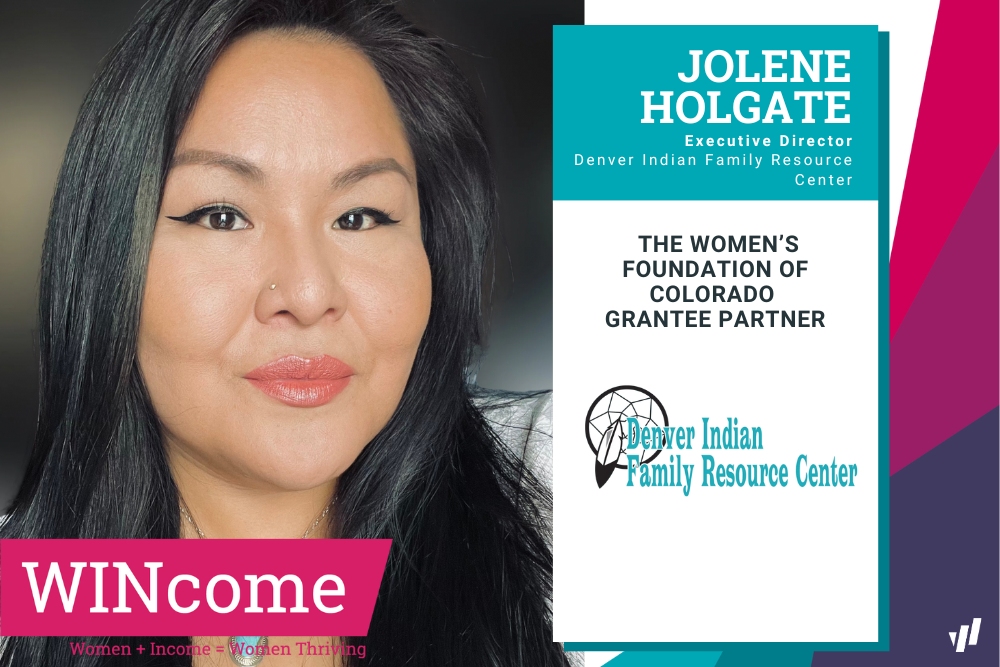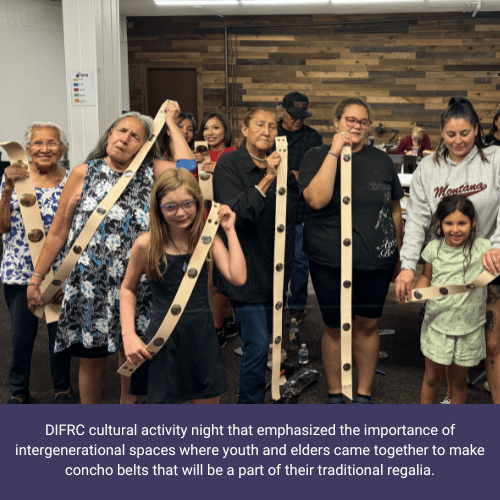
New Leader Helps to Heal, Protect Denver’s Native Community
Denver Indian Family Resource Center Addresses the Historic, Systemic Injustices of Indian Child Removal
A searing 2023 report from History Colorado confirmed a piece of the atrocious history of genocide in our state that Native Americans already knew to be true: dozens of the children entrusted to Native American boarding schools more than a century ago died under their care.
The report reaffirmed the critical mission of Denver Indian Family Resource Center (DIFRC). Founded in 2000, DIFRC helps tribal nations heal from the trauma they’ve experienced because of various practices of Indian child removal such as boarding schools, discriminatory adoption policies, and inadequate enforcement of the 1978 Indian Child Welfare Act. Through case management and advocacy, the agency has an 89% rate of successfully reunifying and preserving Native families.
One of DIFRC’s strategies for success is ensuring mothers and caretakers have access to the resources they need to keep their children in their families. A tool that has proven invaluable is the funding they receive through The Women’s Foundation of Colorado’s WINcome grantmaking program, which provides holistic resources and flexible cash assistance to mothers.
Holgate brings expertise in advocacy, learnings to DIFRC’s mission
In 2024, Jolene Holgate was named the executive director of DIFRC. Here, she shares her vision for creating pathways to healthy and sustainable foundations for Native families to “take self-determined steps to become strong and resilient in their everyday lives.” Jolene brings to DIFRC extensive experience in addressing gender-based violence, sex trafficking, murdered and missing Indigenous women, and championing legislation that supports the social needs of tribal leaders. As a Diné woman, she leads with an understanding of human interconnectivity and a commitment to collective responsibility to restore and uplift Native children and families.
Tell us a little bit about who you are.
Hello relatives and allies! I am a Diné woman from the Four Corners region in the Southwest from the beautiful lands of the Navajo Nation. I grew up in a small community called Shonto, AZ, and when I became school-age, moved to the border town of Flagstaff, where I went to grade school and high school. We maintained our reservation homestead where I have fond memories of reservation life, most especially the summers with my grandmother and cousins.
How has the Diné culture shaped you as a leader?
My Diné culture teaches us to be committed to a vision of healthy communities where all our people enjoy life and prosper. Our life-ways affirm our Diné principles of K’é (kinship) so that we may continue to journey in Sá’ah Naagháí Bek’eh Hozhó, or The Navajo Beauty Way of Life. This is how we restore and uplift one another by carrying on these core values that keep us balanced and in alignment with Mother Earth, her natural elements, non-human relatives, and our bodies’ connections to the land.
These teachings are things I implement as a leader and keep me grounded in the movement towards healthy and safe communities for Native children and families. We are all interconnected and have a collective responsibility in how we show up for our relatives in need and how we share resources so the safe communities we envision become reality. These core values along with my grandmother’s teachings have allowed me to lead with love, compassion, and integrity.
What drew you to DIFRC and what about its mission is most important to you?
I was drawn to DIFRC’s mission because in 2023 the Indian Child Welfare Act (ICWA) was under attack. Native communities understand how critical it is for us to take action and protect our children and cultural ways of life. I wanted to be a part of that movement to continue to advocate for ICWA and support Native families who can identify with the people who are helping them and understands their needs.
You are new to Colorado. What have you noticed since moving here and starting at DIFRC that has surprised or excited you?
Since starting at DIFRC, it was surprising how much history was behind this organization and the realness of the ebbs and flows of a Native nonprofit organization in Denver. DIFRC has seen tough times and many good times, and it has all been positive learning in all the best ways. Now, as we have re-strategized our services and rebuilt critical service delivery areas, our staff and board continue to push DIFRC forward with a lot of love, grace, and intention. I am so thankful to be surrounded by relatives and community who are with us on this journey!
What do you want people to understand about the history and remaining impacts of injustice for Native women, especially the effects of Indian child removal?
Native people in Denver and all over Colorado understand the history and oppression that Native Americans have experienced for hundreds of years in this country—and we know survival very well. The systemic barriers and gender-based violence affecting our communities are symptoms of what history left behind and the negative cycles Native women are entrenched in.
Despite the history we know, and the injustices Native women have experienced, DIFRC is committed to breaking those cycles through culturally connected services and centering the strengths of mothers, caregivers, and kinship providers in the child welfare system.
Our very existence is resistance to the impacts history has left behind.
How does DIFRC prioritize safety, respect, and dignity?
 Many Native women have utilized the services of DIFRC because we take a trauma-informed and culturally responsive approach to their needs. In the social work field, it is women carrying child welfare work, regardless of where they come from, and it is the same in our Native communities. Native women helping Native women creates a safe space for our clients because they can see themselves in us. And folks on our staff have also lived experiences of being foster kids themselves or kinship providers for their relatives. This mutual understanding between our clients and staff have allowed us to develop a positive rapport with the Native women we work with through trust-building and sharing in cultural knowledge.
Many Native women have utilized the services of DIFRC because we take a trauma-informed and culturally responsive approach to their needs. In the social work field, it is women carrying child welfare work, regardless of where they come from, and it is the same in our Native communities. Native women helping Native women creates a safe space for our clients because they can see themselves in us. And folks on our staff have also lived experiences of being foster kids themselves or kinship providers for their relatives. This mutual understanding between our clients and staff have allowed us to develop a positive rapport with the Native women we work with through trust-building and sharing in cultural knowledge.
We recognize there is a need for connection to Native culture and relatives in the Denver community, and we are proud to fill that need for our clients. The services we provide come from a place of non-judgment, community care, and love for one another. We want to see one another succeed and that spirit is rooted in our values of kinship, support, and being a good relative. We will continue to strive to ensure our space at DIFRC centers our families and children so they receive the best support possible, and they feel seen and heard.
We want to see one another succeed and that spirit is rooted in our values of kinship, support, and being a good relative.
How does DIFRC bring an intergenerational lens to its work addressing Indian child removal?
Grandmothers in tribal communities, and even urban Native communities, are the backbone of our survival, existence, and resilience. It is not uncommon for Native American homes to have intergenerational dynamics in the household where grandmothers are the bonus caretakers of their grandchildren. They hold important knowledge passed down to the children and their love is shown in nurturing ways that honor the development of our Native children and youth.
What does flexible cash assistance mean to the women and families that you support?
The flexible cash assistance has been an important resource that has helped stabilize mothers and kinship providers in avoiding or have entered the child welfare system. It has kept Native families together.
A recent situation in which flexible cash assistance was critical to helping a kinship provider was when an adult sister became the guardian for her 11-year-old brother. Her father had been caring for her younger brother since his mother passed away, however she found out he was not enrolled in school and did not have access to secure food or housing. To avoid child protective services from stepping in, she took it upon herself to talk her father into allowing her to care for her brother while her dad addressed his substance use disorder and to find employment. He agreed. She came to our office and we were able to offer her cash assistance where she purchased school clothes, school supplies, a scooter he could ride to school, a new bed, rental assistance, and groceries.
This example left an impact on our office because this is a situation that we know all too well in Native communities, and we understood that this Native sister was looking out for her brother and was going to ensure he had a stable support system where he was still safe within the care of his own family. This avoided the child from being placed in foster care or taken away from his family. He is able to still see his father and be supported by his adult sister, and to us this models the value of kinship.
Learn more about the history of Indian child removal practices.

